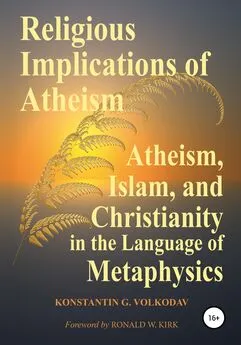Konstantin Volkodav - Religious Implications of Atheism
- Название:Religious Implications of Atheism
- Автор:
- Жанр:
- Издательство:неизвестно
- Год:2021
- ISBN:978-5-532-95383-3
- Рейтинг:
- Избранное:Добавить в избранное
-
Отзывы:
-
Ваша оценка:
Konstantin Volkodav - Religious Implications of Atheism краткое содержание
Religious Implications of Atheism - читать онлайн бесплатно ознакомительный отрывок
Интервал:
Закладка:
Therefore, we will try to consider the discussed problems alone, in creative silence, that is, we will present our views in the genre of Plato’s Dialogues. However, it would not be correct to analyze the dispute between atheists and believers in a completely abstract way, without reference to specific individuals. It is not very nice to argue with fictitious opponents and refute the arguments of marginal anonymous (as atheists often do). Therefore, we will comment on one specific dispute here, by the example of which we will try to reveal the essence of all similar disputes. This is a debate between a prominent representative of Atheism and a well-known representative of Islam. In addition, we will comment on their polemic from the point of view of Christianity. Thus, three points of view will be presented here, and the problems discussed will be shown as if in “three-dimensional”.
Debate video source:
https://youtube.com/watch?v=uSwJuOPG4FI
Title:
The Big Debates: Islam or Atheism—Which Makes More Sense?
London, March 9, 2013
Participants:
Professor Lawrence Maxwell Krauss is a renowned cosmologist and popularizer of science, founder of the Faculty of Earth and Space Studies and honorary director of the “Origins” project at the University of Arizona (USA), author of about three hundred scientific publications and nine books, including international bestsellers “The Physics of Star Trek” and “A Universe from Nothing: why there is something rather than nothing”.
Hamza Andreas Tzortzis is a student of the organization “Islamic Thought”, author, lecturer, employee of the Islamic Education and Research Academy (iERA).
00:00:24: Introduction – Timothy Yusuf Chambers (Moderator)
00:06:30: Opening Remarks – Hamza Tzortzis
00:32:02: Opening Remarks – Lawrence Krauss
00:59:33: Rebuttal – Hamza Tzortzis
01:14:28: Rebuttal – Lawrence Krauss
01:22:43: Summary Discussion
01:42:07: Question & Answer Session
02:06:00: Closing Remarks – Lawrence Krauss
02:07:50: Closing Remarks – Hamza Tzortzis
Below we will alternate our comments with quotes from the debates, highlighting them in different fonts. For this, we transcribed the video into text. For the sake of brevity, we have skipped irrelevant parts of the discussion. The timestamps are indicated in square brackets.
Debates and Comments
[00:00:58–00:03:03] Moderator: I start by praising God, the Compassionate, the Merciful . . . Peace be upon whole gathering! . . . Welcome and thank you very much for attending. This that I hope will be a seminal debate between two respected speakers on the left and the right. That is all about. It is about a debate and it is about of come together and been truth to each other . . . Tonight’s challenging debates in title “Islam or Atheism: Which Makes More Sense?” is not happening in a vacuum, quantum and otherwise. It is taking place within a context of the world full of human beings looking for answers, in a world similarly full of Western promise, a world full of information hub by the IT. However, IT and we seem fail to adequately answer the most fundamental questions about life, our existence . . .
Comment 1
In general, everything he said correctly, however, the formulations are not quite clear. Any instrument cannot measure meaning, and one cannot say where it is more and where it is less. The meaning is either there or not. It would be more correct to say, “Islam or Atheism: what gives a person the meaning of life?”
It is also not clear what “Western priorities” are meant? For the last two hundred years, the West has been dominated by secular, that is, atheistic priorities. Fundamental questions, which from time immemorial have occupied the best minds of humankind: “How to find the truth?”, “How to distinguish between good and evil?” and so on, previously were solved in a metaphysical or religious context. The atheistic worldview directed the search vector to purely material aspects. Only that which can be verified by experiment began to be considered true. In general, instead of asking, “Where is the truth?” the priority was given to the question: “What is more useful?” Instead of metaphysical moral truths, the priority was given to the question, “How to become successful and avoid failures,” etc. Information technology has nothing to do with it. This is just a technical tool that does not answer any questions. However, if people replace live interpersonal relationships only with dry transmission of information, then some metaphysical qualia [3] . For more information on qualia, see: Волкодав, Эволюция , 139.
disappear from these relationships.
The poet Yevgeny Baratynsky well expressed this general tendency back in 1842 in the following verses:
“The century walks along its iron path;
In the hearts of self-interest, and a common dream
Hour by hour vital and useful
Clearer, shamelessly busy.
Disappeared in the light of enlightenment
Poetry, childish dreams
And generations are not worried about it,
They are devoted to industrial cares”. [4] . A translation from Russian to English.
On metaphysics
Here we will often talk about metaphysics. Therefore, it is worth noting that the term “metaphysics” arose quite accidentally. In in the seventies BC Andronicus from the island of Rhodes systematized the works of Aristotle and arranged them thematically. At the beginning, treatises related to the laws of nature (Gr. φύσης) were collected, and after them (Gr. µετά τα φυσικά), works of a philosophical nature were placed.
Despite the fact that metaphysics often talks about God and immaterial entities, it cannot be equated with religion. Aristotle did not write about religion. He simply divided the realm of reality, which can be cognized by rational and experimental methods (physics) and the realm of reality, which can only be spoken about in the language of philosophy (metaphysics). Thus, he was well aware that the methods of physics (and other rational sciences) have a limited field of application, with their help it is possible to study only part of reality.
Aristotle laid the foundations of physics (as a systematic science) and he also laid the foundations of metaphysics (as a separate field of knowledge). So if physicists ridicule metaphysics, they ridicule the founder of physics.
Moderator: Which is, of course, the main core area, we gone be addressing tonight in this auditorium in London . . .
I remember, you know, spending a large part of my life asking myself, “Why am I here? Who created me? Do I have a purpose?” Do we be certain about any of these questions?
Comment 2
Of course, these questions concern humanity throughout all its history. Exactly these metaphysical questions are underlying any religion. In search of answers to these questions, people look at these debates [5] . The video footage of this debate on https://www.youtube.com/watch?v=uSwJuOPG4FI in eight years have been watched by more than forty one million people.
and others like them.
Therefore, it would be logical to ask prof. Krauss, an cosmologist-atheist, how from the “quantum fog” or from the “Big Bang” to go to a person interested in the issues of being and the meaning of life, his own higher destiny. Evolution cannot be involved in this, since these questions are purely metaphysical and have nothing to do with natural selection or adaptation for the sake of survival. No animals ask such questions in principle, and they have nothing like this even in embryonic form. Unfortunately, the participants in the debate did not even come close to this important topic at all.
Comment 3
The Same “Dimension” of Atheism and Religion
This is perhaps the first religious aspect of atheism to pay attention too. In physics, the concept of dimension plays an important role. One can somehow compare and contrast values of only one dimension. It is impossible, for example, to compare mass and temperature, something triangular and something bright. The same is in the field of human thought and creativity. Nobody will have a debate on the topic: “Mathematics or Music—Which Makes More Sense?” “Chess or Swimming—Which Makes More Sense?” There has never been a debate on the topic: “Atheism or Architecture—Which Makes More Sense?” or something similar. However, the debate on the topic: “Atheism vs Religion” happen very often. Moreover, they happen in the same way as the debates between different religions.
Attempts are sometimes made to bring atheism to a “common denominator” with religions, considering it as a worldview. However, the worldview is an attribute of religion. Therefore, Krauss avoids the term, preferring to emphasize a “common sense”. Nevertheless, no matter how one characterizes atheism; common sense and whatever else and all the same can be found in any religion. Thus, the very fact of the debate between religions and atheism speaks of their equal conditional “dimension”—this is one area of the human spirit.
Moderator: Once I asked a bishop, “What is the purpose of life?” And he said to me, “Go and do a theology degree.” I am not telling you to do theology degree, I am asking you to sit here in the debate for two hours with my two honorable guests over here.
Comment 4
Of course, the bishop should not have rejected the person who asked difficult questions in such a way and put on him a burden that he could not bear. However, in theory, the bishop is right. In short, they may be misunderstood. Moreover, even a two-hour lecture will not help much. Jesus Christ taught the apostles for over three years, but they still did not understand much. Theological education takes much more time than, for example, studying physics or mathematics. In the nineteenth century in Russia, education at the Theological Seminary and Academy took twelve years. The same length of study now with Buddhists. I have been studying Christianity for over twenty five years, got my doctorate degree, but I see before me a whole ocean of unexplored. In general, despite two thousand years of hard work of theological thought, a long series of important questions remain unanswered.
Читать дальшеИнтервал:
Закладка:

![Константин Бальмонт - Константин Бальмонт и поэзия французского языка/Konstantin Balmont et la poésie de langue française [билингва ru-fr]](/books/613502/konstantin-balmont-konstantin-balmont-i-poeziya-frantsuzskogo-yazyka-konstantin-balmont-et-la-po-sie-de-langue-fran-aise-bilingva-ru-fr.webp)






